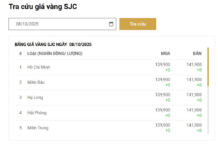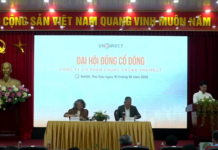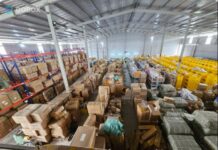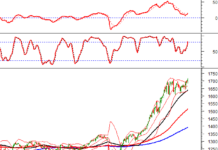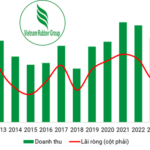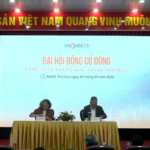Vietnam’s Development Story
Brook Taylor and Sam Korsmoe’s idea to write the book, “Vietnam: Asia’s Rising Star,” came at the onset of the Covid-19 pandemic, and they spent three years bringing it to fruition.
Their book revolves around the hypothesis that Vietnam is Asia’s next “economic dragon,” poised to emulate the trajectory of high-income countries like South Korea and Taiwan. To substantiate this, they delve into six critical aspects: economic growth metrics, export performance, industrialization, high-quality human resources, international market access, and state leadership.
The authors conducted unique research to identify opportunities and challenges for Vietnam in its quest to escape the middle-income trap and achieve its goal of becoming a high-income country by 2050. This involved a comparative analysis with the development trajectories of South Korea and Taiwan.
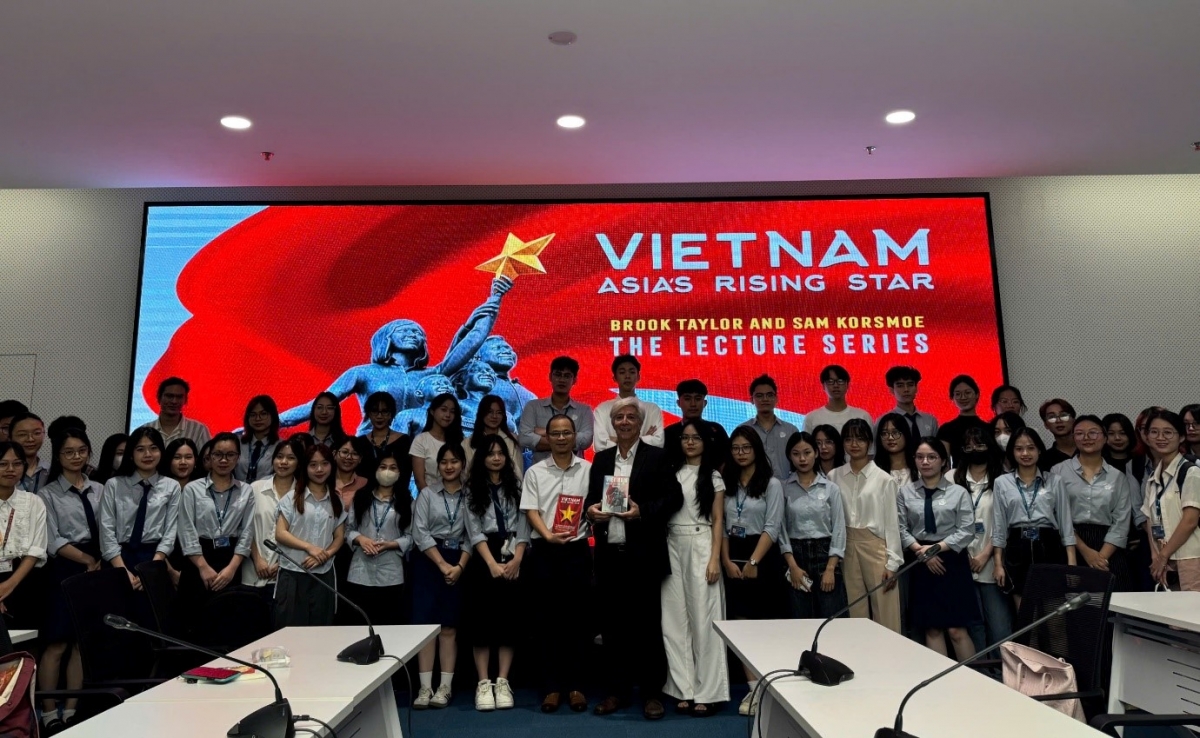
Author Sam Korsmoe introduces the book to students at the Academy of Diplomacy. (Photo: International Relations and Diplomacy, Academy of Diplomacy)
While the book is replete with charts, data, and analysis, it remains engaging as the authors seamlessly weave their findings with insights into Vietnam’s political, historical, economic, and socio-cultural landscape. They narrate Vietnam’s development journey from post-unification to the present, painting a clear picture of the drivers that will propel the country’s future progress.
Together, Taylor and Korsmoe bring nearly six decades of experience and connection to Vietnam. They first arrived in the country in the 1990s and have witnessed its remarkable transformation from one of Asia’s poorest nations to a high middle-income country, now aspiring to attain high-income status by 2045. Taylor has a background in business and finance, while Korsmoe’s expertise lies in journalism, literature, and education.
Beyond data analysis and case studies, the authors emphasize two key characteristics that underpin Vietnam’s growth trajectory: “resolute will” and “pragmatic thinking.” They argue that these qualities have been instrumental in navigating challenging periods in Vietnam’s history, driving its renewal, and fostering deep international integration.
On the topic of resolute will and pragmatic thinking in politics, the authors commend Vietnam’s leadership for their receptiveness to public opinion and their ability to make necessary adjustments, resulting in effective policies. They write, “Vietnam has demonstrated accountability. They have an efficient political mechanism to improve the lives of the majority.”
Assessing Vietnam’s Prospects for High-Income Status
After dissecting historical trends and providing empirical evidence, the book poses pivotal questions about Vietnam’s future: Can Vietnam sustain its high growth rates? Will it escape the middle-income trap? And how will it achieve high-income status?
Taylor and Korsmoe identify several “trump cards” that Vietnam can leverage to attain high-income status: attracting global manufacturers, harnessing the power of collective action for the common good, capitalizing on demographic and urbanization advantages, empowering women, utilizing natural resource endowments, tapping into the Vietnamese diaspora, embracing technological advancements, and skillfully navigating international relations.
The book concludes, “Vietnam holds a strong hand. These are its advantages in the 2020s and beyond. They may also be the answers to many unanswered questions about the future.”
The authors outline opportunities and challenges for Vietnam in its pursuit of high-income status, drawing comparisons with South Korea and Taiwan. They emphasize the need to capitalize on the “golden population” structure and develop high-quality human resources, particularly in science and technology, while also addressing the challenges posed by an aging population.
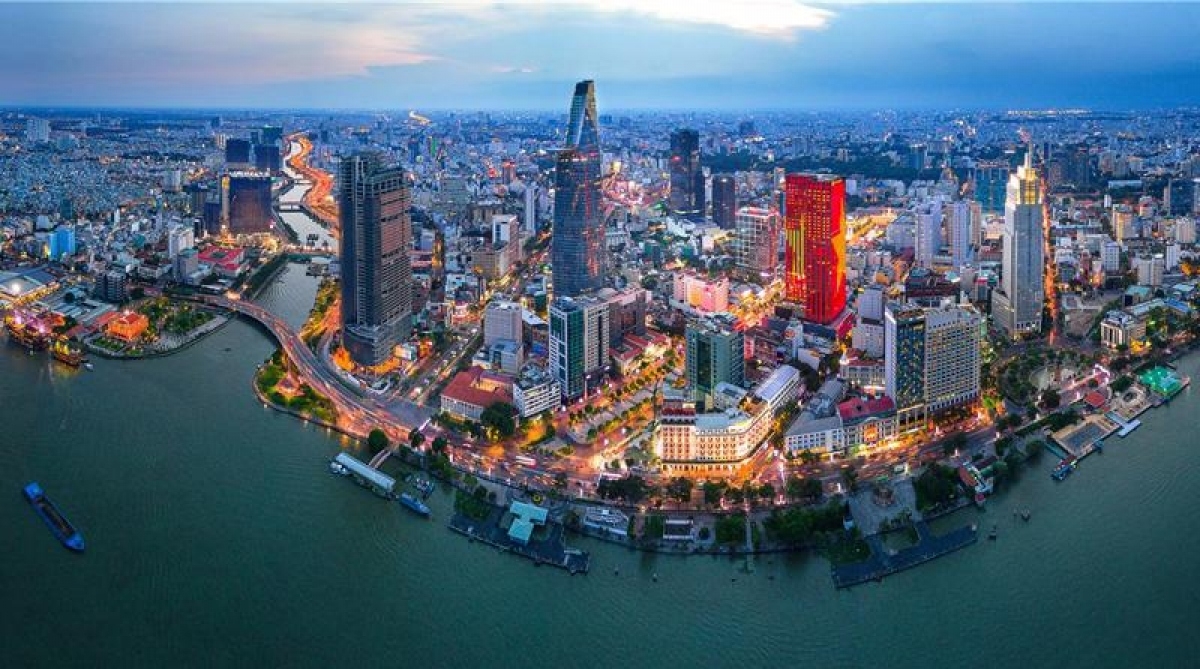
Vietnam has been experiencing robust development.
Regarding Vietnam’s prospects for high-income status, the book presents three scenarios:
In the standard scenario, Vietnam’s economy is projected to grow at approximately 6.23% annually from 2023 to 2050, maintaining the pace of the previous two decades.
The cautious scenario forecasts a slightly slower growth rate of 5.23% per annum over the same period, a reduction of 1% compared to the standard scenario.
Conversely, the optimistic scenario envisions a growth rate of 7.23% per annum from 2023 to 2050, an increase of 1% compared to the standard scenario.
“Vietnam has proven its ability to sustain stable economic growth for several decades, and its resources and comparative advantages are expected to endure. Our analysis suggests that Vietnam will attain high-income status by 2035 (optimistic scenario) or 2045 (cautious scenario). Achieving this milestone around 2040 (standard scenario) would be a remarkable accomplishment,” the book states.
The authors express their optimism about Vietnam’s ability to fulfill its aspiration of becoming a high-income country and transforming from a war-ravaged nation into a prosperous one. They also hope that their book will inspire both Vietnamese and foreigners living in Vietnam to contribute to the country’s ongoing success story.
High-Speed North-South Railway: Why the Slow Progress Isn’t Derailing the Project?
The high-speed North-South railway project, with a total investment of over $67 billion, has just been approved by the National Assembly. After nearly two decades of preparation, this is considered an opportune time as Vietnam has met all the necessary conditions and the best options for the project.
The Market’s Expectations for a Booming IPO Scene in the Next Three Years
A host of new policies, including the Securities Law and the Law on Public Property Utilization, along with various amended laws, will come into force and be implemented in 2025. These legislative changes are set to fuel an explosive IPO market.









